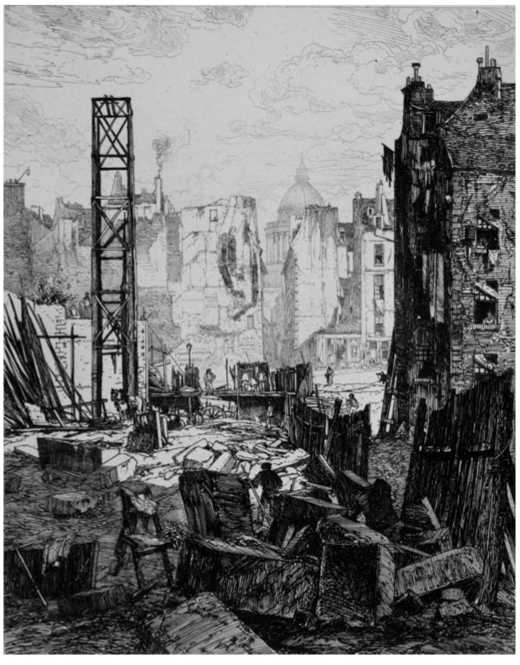French Literature: A Very Short Introduction (14 page)
Read French Literature: A Very Short Introduction Online
Authors: John D. Lyons

It is understandable that the metropolis in mid-century should
offer freedom and opportunity on a quite different scale from
any other city in France, for it was growing explosively. In 1801,
Paris had had virtually the same population as at the end of the
17th century, roughly half a million inhabitants in an area of
less than 14 square kilometres. By the end of the century, the
population quintupled, and Paris had annexed nearby towns and
villages so that the urban area was eight times larger. Such an
environment favours the `God of chance' Baudelaire attributed
to Emma Bovary, and he seized for himself a poetic persona well
adapted to this moment, that of the stroller (le flaneur), a role
that he describes in an essay on the painter Constantin Guys, `The
Painter of Modern Life': `For the perfect stroller, for the passionate
observer, it is an immense pleasure to dwell in the multitude, in
the undulating, in movement, in the fleeting, and the infinite'.
The sonnet `To a Woman Passing By' (A unepassante, in Les
Fleurs du mal [Flowers of Evil]) illustrates the intensity and the
chance nature of the encounters that the poet-stroller prizes in the
immense, fast-moving, modern city. The two quatrains, with no
addressee, describe a crowded street scene and then the vision of a
striking woman. The tercets start by evoking the woman's glance,
and then the poet addresses the woman directly. The lightninglike strike of the glance turns the poet's thoughts forward from
this encounter to the improbability of future encounters, and
shifts the sonnet into a thematic well known to Emma Bovary and
her readers: the longed-for elsewhere and another time, when love
is fulfilled. The single italicized word,jamais (never) - Baudelaire
almost never used italics - stresses the other-worldly character
of this time, which may not come in this life. The woman, who is
in mourning, may indeed be Death, but she may also be simply a woman in the crowd whose ephemeral image nourishes the poet's
imagination and to whom the poet attributes an equal role in this
mental exchange. The very title of the poem suggests extremes,
the fullness of life in a city in which people move rapidly and pass
one another (as they do not in a village) and also the eventual
absence of movement of someone who has passed beyond life -
life and death themselves telescoped into the antithesis of a
lighting flash followed by darkness.
A variant of Hugo's double man, the stroller is exquisitely attuned
to time, and especially to the vanished past and to the dissonance of near misses. He lives vividly both in the Parisian present
and in the past and the elsewhere. In `The Swan' (Le Cygne,
dedicated to Victor Hugo, 1860), Baudelaire builds his poem
around another chance encounter in a Paris undergoing the
colossal transformations that Haussmann carried out between
1853 and 1870 and that created the city of wide boulevards and
standardized building heights that we know today. In the process,
most of medieval Paris disappeared, thus endowing the vestiges
of the Middle Ages with a new, nostalgic, value.
A une passante
To a Woman Passing By
In `The Swan', Baudelaire creates a deft mosaic of different
moments, especially three: the present, in which he is crossing the
newly constructed Place du Carrousel between the Tuileries and
the Louvre; a past moment when there had been a menagerie in
that place; and the imagined moment in Greek antiquity when
the Trojan prince Hector's widow Andromache, become the
slave of Pyrrhus, bends over the cenotaph of her heroic husband.
Translated by Geoffrey Wagner, Selected Poems of
Charles Baudelaire (New York: Grove Press, 1974)

10. Maxime Lalanne (1827-86), `Demolition work for the construction
of the Boulevard Saint-Germain, a scene from Haussmann's renovations
of Paris
Baudelaire assembles these moments along the thematic axis of
absence: in crossing the Carrousel, he sees that the menagerie is
no longer there. In that menagerie, a swan had escaped from its
cage, and vainly sought water from the dry pavement. The poet
imagines the swan remembering the lost lake of its youth and then imagines Andromache remembering Hector. The last three
quatrains of the poem evoke a myriad of others who have lost
something, and specifically those who have lost a place, like the
`emaciated and tubercular Negress ... seeking... the missing palm
trees of proud Africa'. The stroller is thus the guise in which the
city poet can multiply his experience of narrative characters, for he
identifies himself with each in turn: Andromache, the swan, the
African woman, and perhaps even with the dying hero of the Song
of Roland: An old memory blows a horn with full force'.